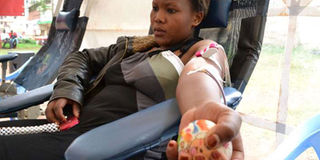Patients at risk of contracting disease through donated blood

A Nyeri youth donates blood at Whispers park in Nyeri town on August 27, 2012. Donated blood is screened for hepatitis B and C, HIV and syphilis. PHOTO | JOSEPH KANYI | NATION MEDIA GROUP
What you need to know:
How malaria is transmitted:
Mosquito bite by female anopheles mosquito.
Blood transfusion with blood containing malaria parasite.
Transplant with organs from a donor who has malaria.
From mother to child also congenital malaria.
Shared use of needles or syringes contaminated with blood.
Doctors have indicated that unscreened donated blood is a potential avenue of spreading malaria to patients.
The blood is hardly screened despite the fatalness of malaria transmitted through such means.
Instead, recipients — mostly children and pregnant women with complications — are given anti-malarial drugs shortly after receiving the blood.
This procedure exposes them to drug resistance and possible allergies. It also raises the cost of treating the disease.
However, donated blood is screened for hepatitis B and C, HIV and syphilis.
Government policy requires that malaria drugs be administered only after a lab test confirms one is infected.
Patients with anaemia, those undergoing surgery, survivors of disasters, emergencies and crashes and patients with cancer and leukaemia are among those who require blood transfusion.
Dr Valerie Magutu, a clinical pathologist from the haematology unit at the University of Nairobi says infants in areas where malaria is endemic but have not had repeated exposure to the parasite are also susceptible to transfusion-transmitted malaria.
“The transfused blood goes straight to the bloodstream unlike parasites from a mosquito bite which go into the liver first before making their way to the bloodstream,” Dr Magutu says.
While it is not clear how many Kenyans get the transfusion-transmitted malaria, the Kenya National Blood Transfusion Services says it does not screen for the disease because “it is not within policy.”
Malaria claims at least 4,000 lives annually in Kenya — most of them children — with an estimated 25 million citizens at risk of the disease.
HEALTHY MEASURES
National Blood Transfusion Services director Margaret Oduor told the Nation that there were plans for a joint study on how to handle the dilemma of whether to screen blood for malaria or to presume infection after transfusion and thus use malaria drugs.
“We have had claims of people saying they got malaria after a blood transfusion but we cannot ascertain that until we conduct the study,” Dr Oduor said.
“But we usually ask a donor if he or she has malaria or is on antimalarial drugs. In such a case, we cannot allow them to donate blood.”
However, donors in malaria prone areas such as western and the coastal regions can have low levels of parasites without developing symptoms.
Using history alone to identify such carriers is difficult.
According to Dr Magutu, such blood may contain the parasite “and any malaria screening test used by the transfusion services needs to be very sensitive”.
The preferred molecular testing is expensive, especially for public hospitals.
Chief research officer at Kenya Medical Research Institute Bernhards Ogutu said if such infections were not treated, a patient could die.
“Transfusion is meant to bring the blood up and if you have parasites that destroy the red blood cells again, then you negate the benefit of the transfusion,” Dr Ogutu said.
Donated blood can be treated using Ultra Violet radiation and Vitamin B2 to minimise the risk of malaria infection following blood transfusions.
In a study published in the medical journal The Lancet on Ghanain patients who received the treated blood, it shows although the risk of malaria transmission is “not completely eliminated, the risk is severely reduced.”
Lead author from the University of Cambridge, Cambridge, UK Prof Jean-Pierre Allain said the technology is currently in the testing phase adding: “It would also address concerns from emerging pathogens such as Babesia microti, West Nile virus, Chikungunya virus, and Zika virus.”
WHO recommends that all blood donations should be screened for evidence of infection prior to use.
WHO estimates that 1.6 million blood donations are discarded due to the presence of HIV, hepatitis B, hepatitis C and syphilis.
GOVERNMENT'S EFFORT
At the same time, the government targets to spray all homes in regions prone to malaria with mosquito repellents.
Ministry of Health says Migori County will kick off the indoor residual spraying exercise in June. It will then be rolled out to other regions in 2017.
Head of Kenya’s Malaria Control Unit Dr Waqo Ejersa said they will target homesteads in Awendo and Rongo sub counties with indoor residual sprays that will repel mosquitoes for between six to nine months.
Dr Ejersa said this is one of the interventions, though considered expensive to carry out, in tackling the spread of malaria.
“The chemicals such as the one we will be using called Actellic 300 CS will be lethal to mosquitoes but safe for humans.
Initially, we had opted for another chemical but the Ministry of Agriculture told us it was not safe for public health. We settled for what we will use in Migori and then spread out to other regions next year. USAID will be partnering with us,” said Dr Ejersa.





